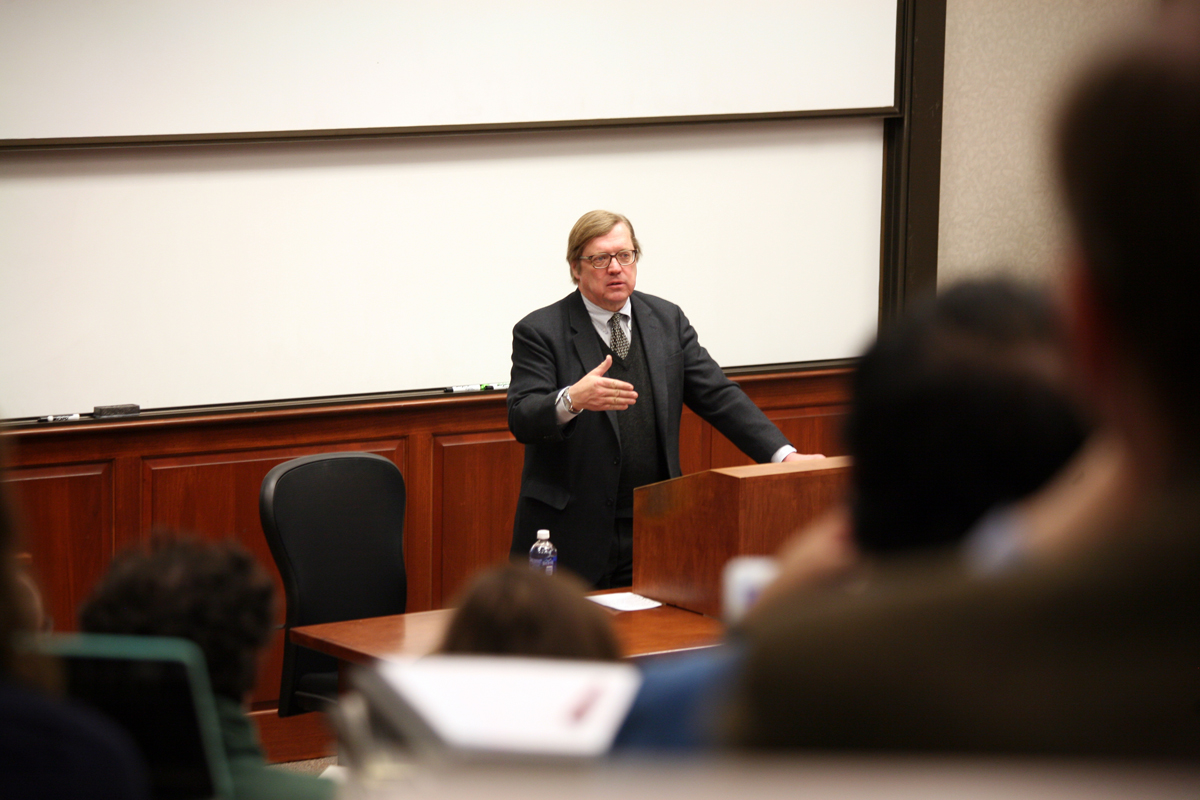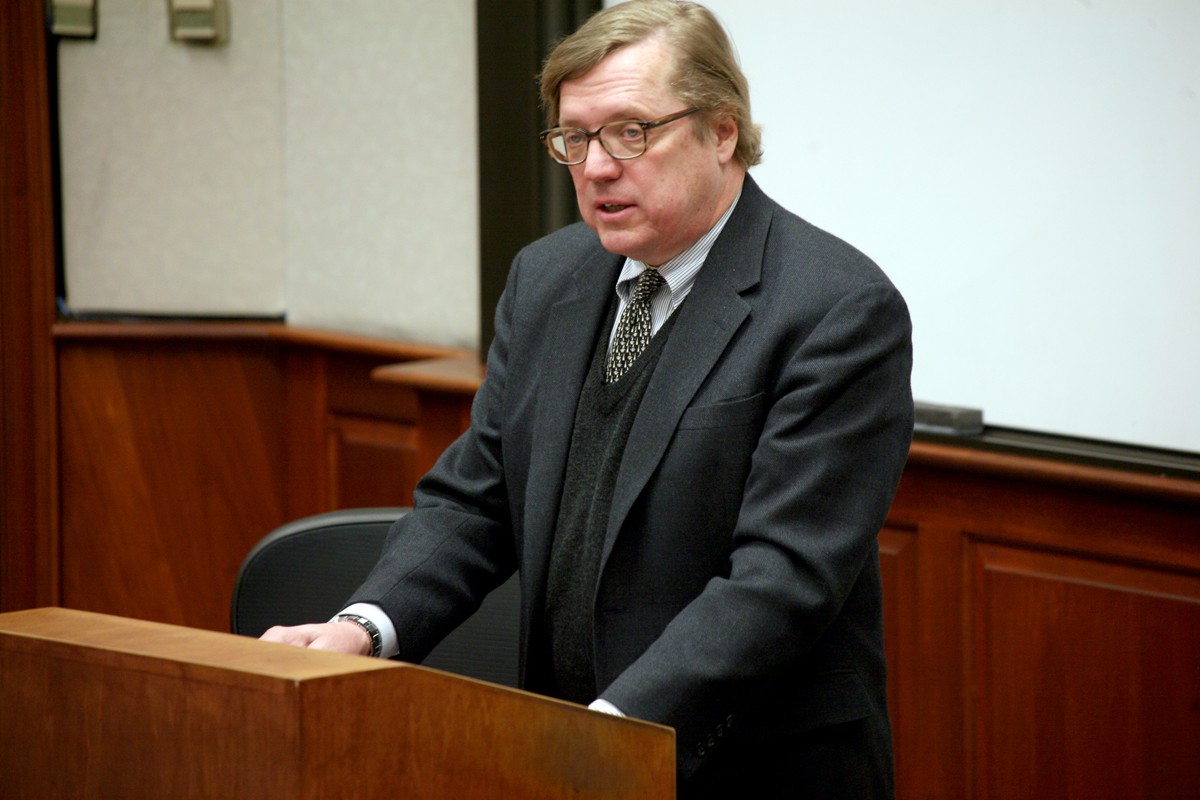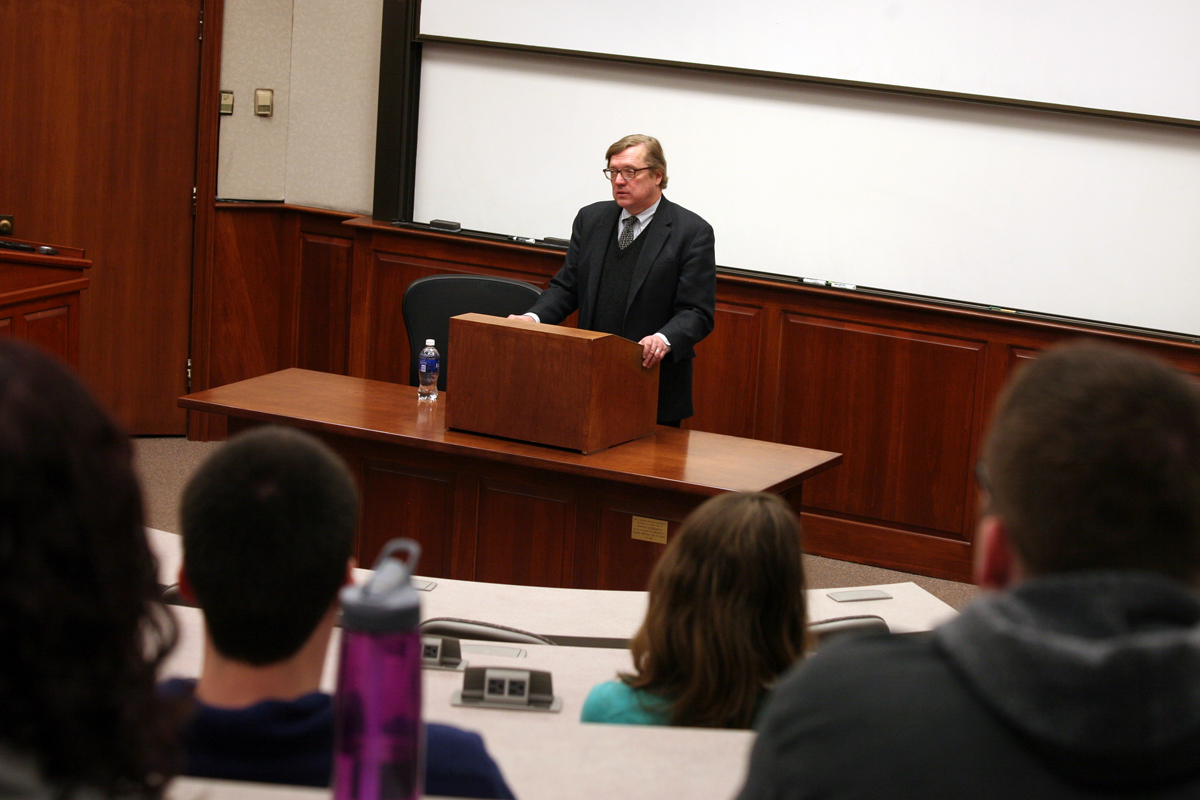Guest Speaker: Ambassador David Scheffer
“On February 4th, a survivor of the Pol Pot regime’s rule over Cambodia in the 1970s testified in a courtroom in Phnom Penh that as a 15 year old he witnessed children being smashed against palm trees by the Khmer Rouge. Their gallbladders were removed and hung beside them.”
So began an address by Ambassador David Scheffer, the United Nations Secretary General’s Special Expert on United Nations Assistance to the Khmer Rouge Trials and former United States Ambassador-at-Large for War Crimes Issues, before an audience of approximately 100 students, faculty, and guests at William and Mary Law School. In solemn commemoration of both the tenth anniversary of the Extraordinary Chambers in the Courts of Cambodia (ECCC) and the fortieth anniversary of the reign of the Khmer Rouge regime, Ambassador Scheffer heralded the numerous accomplishments of the ECCC while also addressing the range of challenges it has faced.
The ECCC was created on April 29, 2005 by a treaty between the United Nations and the Royal Government of Cambodia. Proceedings began in February 2006 and became fully operational in June 2007. The ECC is unique in that it is not a purely international independent court like the International Criminal Court (ICC), nor is it a predominantly international tribunal like the International Criminal Tribunal for the Former Yugoslavia (ICTY) or the International Criminal Tribunal for Rwanda. Rather, the ECCC is designed to “flip the equation” by functioning as a hybrid court with subject matter jurisdiction in international criminal law but also rooted in Cambodian domestic laws and procedures. It was in that context that Ambassador Scheffer urged the audience to consider the ECCC’s limited mandate to deliver justice to surviving senior Khmer Rouge military and political officials believed to have been most responsible for crimes against humanity, war crimes, and genocide. The temporal jurisdiction is defined as the four year period of Khmer Rouge rule under Pol Pot from April 17, 1975 to January 6, 1979, during which an estimated 1.7 million Cambodians perished.



Ambassador Scheffer explained the organization of the ECCC in detail and the fact that it was in many ways a product of compromise resulting from a multi-year exercise in complex diplomacy. The ECCC has a Pre-Trial Chamber and Trial Chamber with three Cambodian and two international judges, while the Supreme Court Chamber has four Cambodian and three international judges. There is also parity and cooperation with regards to the pairs of Cambodian and international Co-Prosecutors and Co-Investigating Judges. Since proceedings began, Ambassador Sheffer passionately argued that the ECCC has not only achieved substantial progress towards fulfilling its mandate, but it has also substantially contributed to furthering the development of international criminal law in a variety of ways. Ambassador Scheffer highlighted that other tribunals have cited both the ECCC’s procedural and substantive decisions, and that ECCC proceedings have also served as a template and role model for other tribunals, such as the Extraordinary African Chambers’ prosecution of former Chadian President Hissène Habré
Ambassador Scheffer also highlighted the challenges which the ECCC has faced, many of which were typical of post-conflict transitional justice proceedings, while others were more unique to the Cambodian situation. In particular, he highlighted five significant challenges:
- Identifying witnesses and securing the testimony of those with aging memories
- Securing physical evidence, especially degradation of bodies from mass graves
- Translating important surviving documents which require time-consuming verification and analysis
- Extensive outreach and public education, especially to younger generations of Cambodians with limited knowledge and understanding of the Khmer Rouge period
- Suspects and defendants who are advanced in age (In the current Case 002, Khieu Samphan is 83 while Nuon Chea is 88), and have health issues which have delayed proceedings.
Ambassador Scheffer also spoke at length about the significant logistical and financial challenges which the ECCC has repeatedly faced. The ECCC’s management structure is more complex than most international bodies, with the United Nations Technical Assistance project (UNAKRT) serving as a major component of the operation by supplying international officials and staff. Ambassador Scheffer stressed that all UNAKRT staff and financial transactions are categorized as activities of the United Nations Secretariat at Headquarters to ensure that the United Nations and other international standards are being fully implemented. Ambassador Scheffer emphasized that international criminal justice is inherently a long-term endeavor requiring sustained financial support for the duration of a tribunal’s mandate.
Finally, Ambassador Scheffer emphasized the ECCC’s role in enhancing and indeed perhaps revolutionizing the accessibility and transparency of transitional justice proceedings. He noted that as of February 23, 2015, a total of 165,407 people have witnessed trial proceedings in person—the majority of whom were Cambodian. The number of ECCC spectators exceeds the combined spectators of Nuremberg and Tokyo tribunals, the ICTY, the Special Court for Sierra Leone, the Special Tribunal in Lebanon, and the ICC. The ECCC has also spawned several dynamic civil society initiatives with innovative features designed to enhance public knowledge of the court’s proceedings. For instance, Northwestern University School of Law’s Cambodia Tribunal Monitor—funded by the Robert Bosch Stiftung—provides a live blog of the ECCC and provides a daily narrative of court proceedings.
After Ambassador Scheffer completed his address, he solicited a range of questions from the audience. Students were able to ask Ambassador Scheffer a range of questions on procedural and substantive issues and about the involvement of civil society in tribunal proceedings.